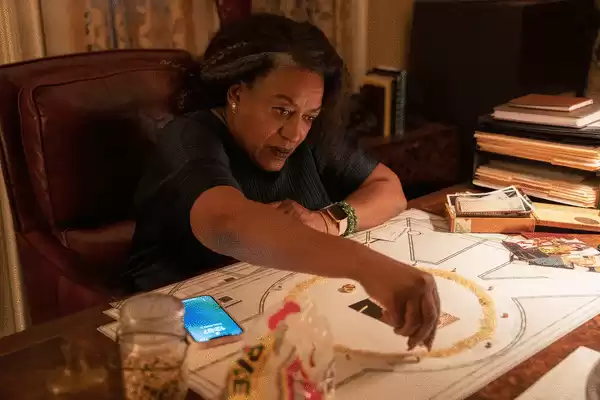Soderbergh's 'Full Circle' Crime Drama Review: Style Overwhelms to Detract
Director Steven Soderbergh collaborates with writer Ed Solomon for "Full Circle," a six-part social, family, and crime drama that premiered on Max. The series follows the story of a Guyanese racketeer in New York and a kidnapping plot. The show explores themes of race, class, and morality, with a focus on the least powerful characters. While the series has its flaws, it becomes more engaging as it progresses.
In the latest collaboration between director and producer Steven Soderbergh and writer Ed Solomon, "Full Circle" takes viewers on a wild ride through a six-part social, family, and crime drama. Premiering on Max, this series is packed with coincidences, hidden connections, and the unpredictable actions of panicked individuals.
The story revolves around Savitri Mahabir, played by CCH Pounder, a Guyanese racketeer operating in the Richmond Hill neighborhood of Queens, New York. Her insurance office profits from the misfortune of its clients, orchestrating their deaths and collecting the benefits. However, Mahabir's life takes a turn for the worse, and she becomes convinced that she is cursed. To break the curse and restore balance, she believes she must perform certain ritual actions and kidnap Jared, the son of Sam and Derek, and the grandson of Sam's father, Jeffrey, known as Chef Jeff (played by Dennis Quaid).
The kidnapping plot incorporates various symbolic circles, such as a ransom figure based on pi and a drop-off location at Washington Square Park's round fountain. Mahabir's superstitious nature confuses her lieutenant, Garmen, and complicates matters for her nephew Aked and his fiancée Natalia. To assist with their criminal activities, Mahabir brings in Louis, Natalia's teenage brother, and his friend Xavier from Guyana. As they navigate the unfamiliar territory of America, they quickly discover that it is not the land of opportunity they had hoped for.
As the story unfolds, mistakes are made by all parties involved. Instead of kidnapping Jared, they mistakenly abduct another teenager named Nicky, who has been stalking Jared. Writer Ed Solomon carefully constructs the narrative, leaving no loose ends and providing explanations for each twist and turn.
While Solomon's previous works, such as "Bill & Ted's Excellent Adventure" and "Men in Black," showcased his humor, "Full Circle" takes a more serious tone. However, there are still moments of levity, like a remark about lifting money bags with your knees. Comedian Jim Gaffigan delivers an amusing performance, despite not having particularly funny material to work with.
Similar to Soderbergh's previous works like "No Sudden Move" and "Traffic," "Full Circle" explores themes of race, privilege, crime, and the consequences that affect both criminals and innocent bystanders. The series does not draw a direct correlation between morality and color or social status. As Woody Guthrie once wrote, "Some will rob you with a six-gun, and some with a fountain pen," and this sentiment is reflected in the diverse cast of characters. Many of them are guilty of some wrongdoing, whether it be violence, dishonesty, or a disregard for the consequences of their actions.
Interestingly, the series evokes sympathy for the least powerful characters, while some others test the audience's patience. However, some characters do experience moments of selflessness or personal growth as the story approaches its conclusion, adding a touch of irony to the overall narrative.
Soderbergh's filmmaking style, known for its blend of mainstream appeal and artistic flair, has been successful in previous projects like "Behind the Candelabra" and "The Knick." However, in "Full Circle," the style occasionally detracts from the realism the director aims to portray. The exaggerated camera movements and somber score create a sense of alienation, unintentionally distancing the audience from the story. Nevertheless, the location scouts and production designer April Lasky deserve praise for their exceptional work in creating a visually captivating world.
While the performances from the star-studded cast are generally strong, some moments feel artificial and performed rather than lived. The series can feel overwhelming at times, with its fast-paced plot and eventful sequences. However, as the episodes progress, Soderbergh eases off the stylistic elements and allows the characters, who have grown more fleshed out over time, to engage in quieter, more reasonable conversations. This shift provides some relief for viewers who appreciate meaningful dialogue.
In conclusion, "Full Circle" is a complex and intricate drama that delves into the lives of its diverse characters. With its mix of crime, family dynamics, and social commentary, the series offers a thought-provoking and engaging viewing experience. While it may have its flaws, including occasional stylistic distractions, the strong performances and well-crafted narrative make it worth the watch.











Comments on Soderbergh's 'Full Circle' Crime Drama Review: Style Overwhelms to Detract